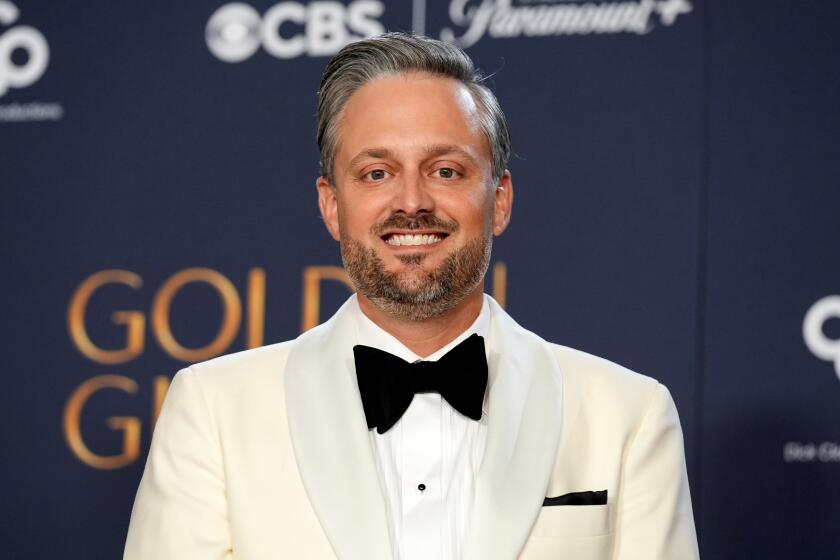Gold Standard: Oscars 2016: ‘The Big Short’s’ heart trumps ‘The Revenant’s’ art
- Share via
If a movie is all-encompassing enough to be embraced by both Bernie Sanders and Bill O’Reilly, how can the film academy deny it?
The film is “The Big Short,” Adam McKay’s scathing dramedy that illuminates, with clarity and righteous anger, how the subprime mortgage bubble caused the economy to collapse in 2008 and why it might well happen again. It earned Oscar nominations Thursday for picture, director, adapted screenplay, film editing and Christian Bale’s already iconic turn as one of the money men who forecast the crisis years before it happened.
Oscars 2016: Full Coverage | Complete list | Snubs, surprises and reactions | Top nominee photos | Oscars are so white, again
This month, Democratic presidential candidate Sanders tweeted a video of a woman asking him if he had seen “The Big Short.”
“Damn right I have,” Sanders responds. “Excellent film.”
Right about the same time, on the other side of the political spectrum, Fox News personality Bill O’Reilly took to Twitter, recommending the movie, saying people could learn a great deal about the financial crash from watching it.
Now, neither of these men have votes in the academy (though they both precisely fit within its dominant demographic — older white male), but their bipartisanship here illustrates one reason why McKay’s movie — and not the brutal frontier western “The Revenant,” which led the nominations pack with 12 — could win this year’s best picture Oscar.
“The Big Short” is about the here and now. Its truth-telling take on economic issues — America’s and, by extension, the world’s — concerns everyone, rich and poor, left and right. It’s a movie that provokes serious, spirited conversation at its awards-season events. It plays at times like a madcap comedy. But at its center, as was noted last week at the AFI luncheon honoring the year’s best movies, “The Big Short” is about a nation’s heartbreak.
What’s “The Revenant” about? Well, cinematic glory, for starters, which explains the dozen nominations spread across crafts categories and for actors Leonardo DiCaprio and Tom Hardy and director Alejandro G. Iñárritu.
But beyond the considerable technique, does “The Revenant” have anything to say other than that revenge is a dish best shot in natural light? The academy isn’t above giving its best picture award to an arty studio film. Martin Scorsese’s “The Departed” won in 2007. But that movie also had a screenplay that went on to win the Oscar. “The Revenant,” tellingly, was not nominated for its writing.
There’s also this question, which academy members were already starting to bandy about minutes after “The Revenant’s” haul became clear: Are Oscar voters willing to crown Iñárritu again, a year after he won three Oscars as a director, writer and producer on “Birdman”?
Nineteen directors have won at least two Oscars. Only two took Oscars in back-to-back years — John Ford for “The Grapes of Wrath” and “How Green Was My Valley” in 1941-42 and Joseph L. Mankiewicz for “A Letter to Three Wives” and “All About Eve” in 1950-51.
In the ensuing 64 years, no director, not Billy Wilder or Frank Capra, not Steven Spielberg or Clint Eastwood (to name four who have been nominated in consecutive years), have pulled off that feat.
Iñárritu, a charming man possessing a healthy ego (i.e. a typical filmmaker), could render these statistics meaningless. Someone has to eventually break this streak. Why not the man who staged that amazing, terrifying tour de force forest attack sequence that opens “The Revenant”?
Two other movies figure into the conversation as well: George Miller’s “Mad Max: Fury Road,” a high-octane opera big enough to contain feminist ambitions, flame-throwing guitars and barking mad humor. Miller’s movie, not Iñárritu’s, bears the stamp of approval from film critics, having won honors from Los Angeles and Chicago groups.
S

hould the academy want to take a more traditional route, there’s “Spotlight,” the polished, old-fashioned procedural following an investigation into a Catholic Church pedophilia scandal. Some pundits believed the film’s status was sliding, but the nods for actors Mark Ruffalo and Rachel McAdams, editor Tom McArdle and the two nominations for Tom McCarthy (directing and co-writing with Josh Singer) indicate solid strength.
Over and out is “The Martian,” which in the day’s biggest head-scratcher earned seven nominations but no recognition for its legendary director, Ridley Scott. To find a movie that won best picture without its director being nominated, you have to go all the way back to ... “Argo,” three years ago. Can the Scott snub boomerang “The Martian” back into the race? Only if the 78-year-old Brit is willing to work the circuit as hard as Ben Affleck did. And I think we all know the answer to that.
More to Read
From the Oscars to the Emmys.
Get the Envelope newsletter for exclusive awards season coverage, behind-the-scenes stories from the Envelope podcast and columnist Glenn Whipp’s must-read analysis.
You may occasionally receive promotional content from the Los Angeles Times.







